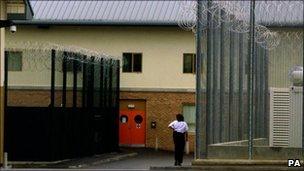Detaining children of failed asylum seekers to end
- Published

The family section of the Yarl's Wood detention centre will be closed
The detention of the children of failed asylum seekers will end by next May, the government has announced.
Parents awaiting forced deportation would still be held in secure houses, but their children would be assigned minders so they can move around freely.
Deputy Prime Minister Nick Clegg said it would mean the UK had one of the "most child-friendly" immigration systems in the world.
The move was a Liberal Democrat manifesto commitment.
The Lib Dems and the Conservatives agreed to implement it as part of the post-election coalition agreement. Prime Minister David Cameron described the practice as a "scandal".
As part of the changes, the family section of the Yarl's Wood detention centre in Bedfordshire will be closed immediately.
Mr Clegg said the decision to no longer detain children in the immigration system "spoke for itself" and marked a "big cultural shift".
"The change prioritises doing the right thing over looking and sounding tough," he said. "Reforms which will give the UK one of the most child-friendly immigration systems in the developed world."
Lorin Sulaiman: "At 14, I should have been at school worrying about my homework"
'Very damaging'
Campaigners have long urged an end to holding children in detention centres - used to hold those who might abscond before they can be deported.
They say there have been 665 cases of children of asylum seekers being detained in the past year.
大象传媒 home affairs correspondent Tom Symonds says the government hopes a softer approach will encourage asylum seekers not to fight their deportation.
But it is understood the change may lengthen the process and have an impact on the numbers deported.
Martin Narey, chief executive of Barnardo's, told the 大象传媒 that detaining children in Yarl's Wood was "very, very damaging", but "not because staff there are monsters or because it's run badly".
Nick Clegg: "We are ending the shameful practice"
"Locking away children who haven't done anything wrong at all - and some of these are very, very young children indeed - putting them in essentially a prison environment with barbed wire, bars and locks is not something we should do."
Asked whether more families would abscond as a result of the relaxation, he said: "I'm not at all convinced there will be more, but if there were a few more it would be a good price to pay.
"It's not just about families. This is a significant day for the UK's reputation as a country that will treat people with compassion."
- Published16 December 2010
- Published7 August 2010
- Published21 July 2010